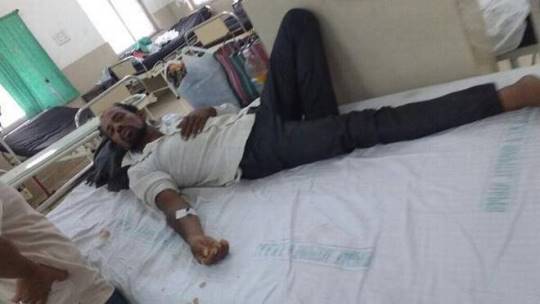Nagpur, Jul 13: The head of BJP’s minority cell in Katol division in Maharashtra was attacked by a groups of about eight persons allegedly for carrying beef. He was rescued after police arrived on the scene following a call from a local shopkeeper.

The incident took place in Bharsingi village, under Jalalkheda police station in Nagpur Rural district on Wednesday morning and came to light when a video of the attack went viral on social media.
“Salim Ismail Shah, a resident of Katol town, was returning to his town when a group of men stopped him and asked him to get off his two-wheeler and show what he was carrying. When he resisted, the men attacked him,” Nagpur rural superintendent of police Shailesh Balkawade said.
Mr. Shah, 34, suffered injuries on his neck and face. He was admitted to a hospital in Nagpur and discharged on Thursday morning. However, he was again admitted again after he complained of uneasiness.
While Mr. Shah is unable to speak, his mother claimed that he was returning from Jalalkheda after selling cotton when the attack took place.
‘Dedicated party worker’
“He was not carrying beef. My son is a dedicated BJP worker,” Ms. Rihana Shah said. “The victim was carrying some kind of meat. He has named four unknown persons. We could establish the identity of all four from the video clip and arrested them. They are not affiliated to any right-wing organisations. One of the accused is a taluka-level president of Prahar, a socio-political organisation,” Mr. Balkawade said.
The BJP’s Nagpur rural president Rajiv Potdar said Mr. Shah was not carrying beef.
“He was and is our party’s active worker and office bearer. We strongly deny the allegations that he was carrying beef. The attackers have no relation with the BJP. They belong to Prahar run by Independent MLA Bachhu Kadu. Prahar people planned and carried out this attack. It was a stunt to defame the BJP,” Mr. Potdar said.




Comments
TO RANJAN SHETTY.
You are blind and deaf. Go and watch all major TV even some of them are biased channels with BJP government.
Non-sense, idiocy
Let him taste the rule of his own party. !!!!!
GST effect .....as these guys were already frustrated by Ram mandir promise ....Hindu rashtra ...bla bla ...now MODI reached so high that these frustrated monkeys can not reach even his PA ....and can not attack him for his continuous Laws like note ban ..GST...etc .....because he is now in Z+ security ...so these monkeys have no option other than '' kailagadava mai parachikonda'''
Add new comment